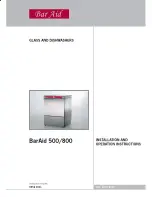
5
Dishwasher detergent is corrosive! Take care to keep it out
of reach of children.
IF THE WATER ISN'T TOO HARD, YOU MAY ALSO PREVENT THE FORMATION OF DEPOSITS BY ADDING DETERGENT.
The amount of detergent needed can vary due to differences in water hardness. To determine the water hardness in your area,
contact your local water utility or area water softening company. The harder the water, the more detergent you may need.
Remember, you should adjust the amount of detergent you use by small amounts until you find the correct amount.
To remove hard water spots, try the following:
Run dishes through a normal wash program.
Remove all metal dishware, such as cutlery, pans, etc.,
from the dishwasher.
Do not add detergent.
Pour two cups of vinegar into a bowl and set the bowl face
up on the lower rack of the dishwasher.
Run the dishes through a normal wash program.
If this doesn't work, try the same process with 1 / 4 cup of
citric acid crystals instead of vinegar.
Use only detergent specifically made for use in dishwashers.
Keep your detergent fresh and dry. Don't put powder detergent
into the dispenser until You're ready to wash dishes.
The rinse aid is released during the final rinse to prevent water
from forming droplets on your dishes that can leave spots and
streaks. It also improves drying by allowing water to "sheet" off
the dishes.
Your dishwashers are designed to use liquid rinse aids. The
rinse aid dispenser is located inside the door next to the
detergent dispenser. To fill the dispenser, open the cap and
pour the rinse aid into the dispenser until the level indicator
turns completely black. The dispenser holds about 100 ml of
liquid rinse aid.
Be careful not to overfill the dispenser, because this could
cause oversudsing. Wipe away any spills with a damp cloth.
Don't forget to replace the cap before you close the dishwasher
door.
If you have soft water, you may not need rinse aid for it may
cause a white film to develop on your dishes.
YOU MAY NOT ADD TOO MUCH DETERGENT TO PREVENT THE FORMATION OF DEPOSITS BECAUSE YOUR DISHWASHERS
HAVE SPECIALLY-DESIGNED WATER SOFTENERS.
The dispenser must be refilled before the start of each wash cycle following the instructions provided in the" Wash Cycle
Table".Your dishwashers
than conventional dishwashers. Generally, only one tablespoon of
detergent is needed for a normal wash load. Also, more heavily soiled items need more detergent. Always add the detergent just
before starting dishwasher, otherwise it could get damp and will not dissolve properly.
use less detergent and rinse aid
To open the dispenser, turn the cap to the "open" (left)
arrow and lift it out.
Pour the rinse aid into the dispenser, being careful not to
overfill.
Replace the cap by inserting it aligned with "open" arrow
and turning it to the closed (right) arrow.
A measured amount of rinse aid is released during the final rinse. As with detergent, the amount
of rinse aid needed for your dishes depends on the hardness of the water in your area. Too much
rinse aid can result in lather of foaming and cause cloudiness or steaks on your dishes. If the
water in your area is very soft, you may not need rinse aid. If you do,you can dilute the rinse aid
with an equal amount of water.
The rinse aid dispenser has six settings. Always start with the dispenser set on " 1 ". If spots and
poor drying are problems, increase the amount of rinse aid dispensed by removing the dispenser
lid and rotating the dial to "2". If the dishes still are not drying properly or are spotted, adjust the
dial to the next higher number until your dishes are spot-free. We suggest you to set on "4" .
(If only four settings we suggest you to set on "2".)
6
In accorance with En50242 standard, the dispenser should be set on the maximum lever when
doing the performance.
Summary of Contents for 32000496
Page 1: ...HEDS968 1 ...

































